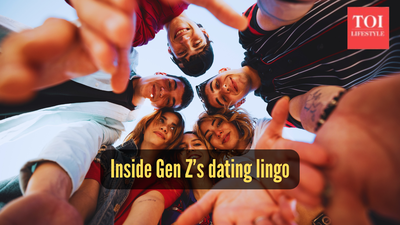ARTICLE AD BOX

If you ever felt lost by a sudden ‘see-you later’ text, or wondered what it meant when someone ‘soft-launched’ you on social media, you’re not alone. For Gen Z, romance isn’t just scattering hearts, it’s also all about those digital terms, fluid dynamics and changed expectations.
As relationships evolve, so does the language describing them. Here are eight of these terms, each unpacked, and explained.
Situationship

Picture this: you spend evenings watching movies, send good-morning texts, but there’s no label, no promise, you’re in limbo. That’s a situationship. It can be termed as an ambiguous space between friendship and romance. On one hand, it offers intimacy without commitment; on the other, it often fosters confusion and unspoken expectations.
Emotional investment rises while the framework remains vague.
Ghosting
‘Poof! — and they’re gone.’ That’s ghosting. When someone drops all contact with no closure. Well, by now it’s clear that ghosting is profoundly painful because the other person is left ‘blindsided.’ The silence becomes louder than any excuse. In a world where swiping right feels casual, ghosting is more about how digital connection can also lead to sudden disappearance.
Breadcrumbing
Imagine crumbs of attention dropped across your inbox, occasional texts, a flirtatious message now and then, but never a real commitment. That’s breadcrumbing. It gives a deceptive sense of optimism while lacking substance. You’re kept interested but not valued.
Submarining
Also called ‘zombieing,’ submarining happens when someone ghosted you earlier, then resurfaces without explanation as though nothing happened. And this raises questions about sincerity. This dynamic can stir old feelings, reopen trust wounds and complicate closure. Recognising it helps one ask: is this return a genuine second chance, or a replay of unresolved drama?
Soft launch

In the Instagram era, announcing your partner looks different.
A soft launch is when someone introduces a romantic interest via subtle posts, maybe a corner of a photo, a cryptic caption, without officially revealing. It means subtle introduction, but without fully revealing their identity. For Gen Z, this mode is somewhere between privacy and performance. It tries to blur personal and public spheres.
Love bombing
Suddenly you’re in a whirlwind of affection, constant messages, lavish compliments, intense attention.
Then it fizzles. That’s love bombing. While it appears romantic, it may be manipulative. The danger? What starts as thrill can morph into control. Recognising love bombing is vital: high intensity early doesn’t guarantee healthy long-term connection.
Benching
Think of being put on hold, not broken up, just paused. Benching means you’re kept around as an option while the other person pursues alternatives. Occasional chats, no real investment.
It also means how easily commitment is deferred. Emotional caution means you might be waiting in limbo. Awareness reduces the waiting-game chances.
Cushioning
A lesser-known but still potent term: cushioning. It’s when someone in a relationship keeps potential romantic prospects as a safety net. While not always intentionally harmful, it undermines transparency and trust. For lovers and friends alike, knowing whether you’re someone’s safety net, rather than first choice, is an important distinction.In the end, love hasn’t changed, it’s just acquired a new dialect. For Gen Z, relationships are negotiated online and offline, labelled and unlabeled, broadcast and hidden. These are some of the often-used terms that aren’t rules for failure; they’re maps of modern connection. Understanding them doesn’t guarantee flawless relationships, but it does bring you closer to clarity, respect and authenticity in the digital age of love.

 3 hours ago
6
3 hours ago
6









 English (US) ·
English (US) ·